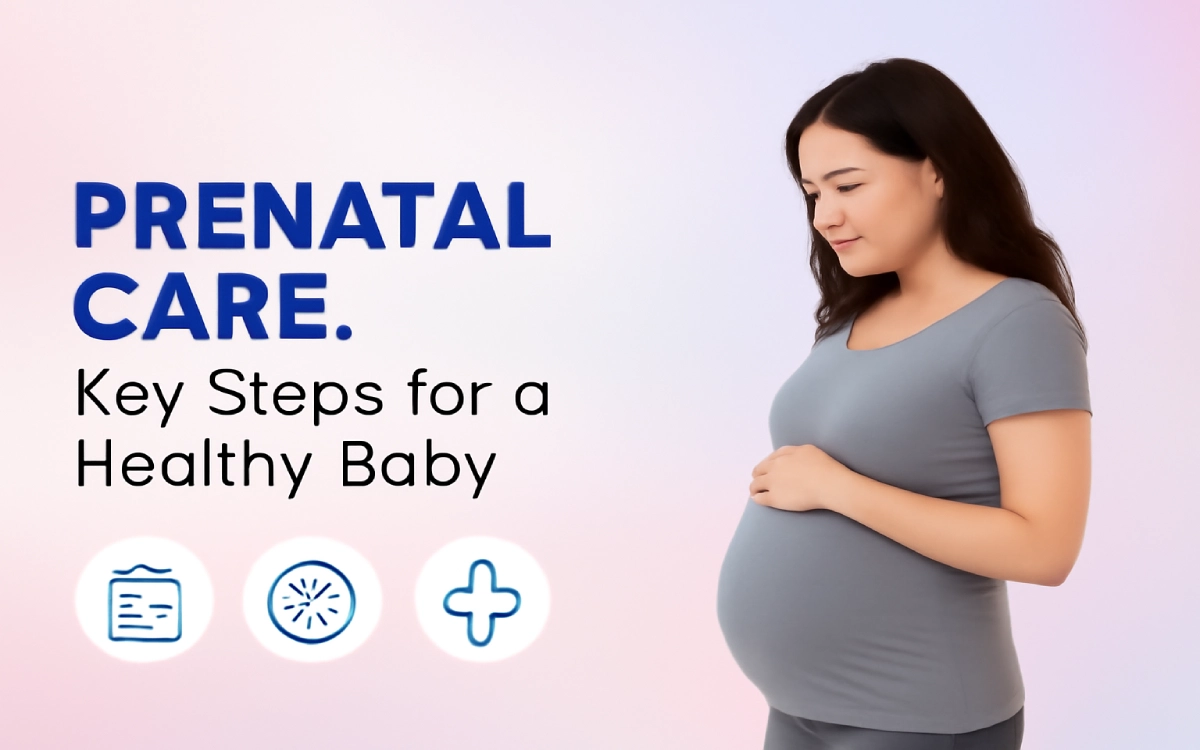Finding out that you are pregnant is one of life’s most unforgettable moments. Along with the joy and excitement comes a deep sense of responsibility. Every choice you make from this moment forward can influence your baby’s growth and well-being. This is why prenatal care plays such an important role. It is more than attending doctor’s appointments; it is a complete approach to supporting your health and your baby’s health throughout pregnancy.
Prenatal care includes a carefully planned pregnancy checkup schedule, proper nutrition for pregnancy, and healthy lifestyle habits that protect both you and your developing baby. These regular checkups allow your doctor to monitor your baby’s growth, identify potential concerns early, and guide you through each stage of pregnancy with confidence. With the right care, you can enjoy a smoother pregnancy, reduce risks, and prepare for the arrival of your healthy baby.
This guide will walk you through why prenatal care is essential, what to expect at your checkups, and the most important healthy pregnancy tips to follow so you can feel supported every step of the way.
Why Prenatal Care Matters in Dubai
Pregnancy in Dubai offers unique opportunities for expectant mothers. The city has some of the best hospitals, highly skilled obstetricians, and advanced technology available anywhere in the world. This means mothers have access to world-class prenatal services. However, living here also brings specific considerations that make a consistent pregnancy checkup schedule even more important.
Dubai’s warm climate increases the need for adequate hydration. Many women also find their diets change when adapting to local food options or living away from family. For busy professionals, balancing work schedules with medical appointments can be challenging, yet these appointments are crucial for early detection and prevention of complications.
The multicultural nature of Dubai means healthcare is accessible in different languages and cultural approaches, making it easier to receive personalised care. Whether you need expert advice on nutrition for pregnancy, help managing conditions such as gestational diabetes, or reassurance during your first pregnancy, prenatal care ensures that both mother and baby remain healthy.
Understanding Pregnancy Changes and Risks
Pregnancy brings many physical and emotional changes as your body adapts to support your baby’s growth. Some of these changes, like nausea, fatigue, breast tenderness, and mood swings, are completely normal and caused by hormonal shifts. They are a sign that your body is adjusting to meet the needs of your developing baby.
While many symptoms are harmless, some can indicate a problem that needs immediate attention. These include severe abdominal pain, sudden swelling of the face or hands, persistent headaches, blurred vision, unusual vaginal bleeding, or a noticeable decrease in your baby’s movements later in pregnancy. Recognising these warning signs early allows your doctor to take action quickly, which can make a big difference to both your health and your baby’s health.
Certain women are at higher risk for complications and benefit from closer monitoring. This includes those with pre-existing conditions such as high blood pressure or diabetes, women who are carrying twins or triplets, those with a history of pregnancy-related problems, and women under the age of 18 or over the age of 35. If you fall into one of these categories, your prenatal care plan will be customised to give you the safest possible pregnancy.
What to Expect from Your Pregnancy Checkup Schedule
Following a structured pregnancy checkup schedule is one of the most effective ways to protect your health and your baby’s health. In the early stages of pregnancy, you will typically see your doctor once a month. After 28 weeks, appointments are usually scheduled every two weeks. From 36 weeks until delivery, weekly visits are recommended.
During each visit, your doctor will check your blood pressure, assess your baby’s heartbeat, and measure your abdomen to ensure your baby is growing as expected. You will have routine tests at different stages, such as ultrasound scans to check your baby’s position and growth, blood tests to screen for anaemia and infections, and urine tests to detect signs of preeclampsia or urinary tract infections. Around the middle of pregnancy, many women have a glucose tolerance test to check for gestational diabetes. Depending on your medical history and age, genetic screening may also be offered.
These checkups are also the perfect time to ask questions and discuss how you are feeling. Whether you have concerns about symptoms, want advice on nutrition for pregnancy, or need guidance on safe exercise, your prenatal visits give you direct access to professional support.
How Prenatal Care Supports a Healthy Pregnancy
Prenatal care is not just about monitoring the progress of your pregnancy. It is a complete plan that supports your physical health, emotional well-being, and your baby’s development. One of the most important elements is ensuring you receive the right nutrients during pregnancy. Your doctor may recommend supplements such as folic acid, iron, calcium, and vitamin D, all of which are vital for your baby’s growth and for preventing complications.
If you have an existing medical condition, your treatment may be adjusted to ensure it is safe for pregnancy. You may also receive advice on managing common discomforts like heartburn, constipation, or back pain. In some cases, you may be referred to a dietitian for specific dietary guidance or to a physiotherapist to help with pregnancy-related aches.
By following your doctor’s advice and keeping up with your appointments, you give yourself and your baby the best possible start.
Healthy Pregnancy Tips for You and Your Baby
Looking after yourself during pregnancy is the most powerful way to look after your baby. Eating a balanced diet is one of the most important healthy pregnancy tips you can follow. Your meals should include a mix of fresh fruits, vegetables, whole grains, lean proteins, and healthy fats. Foods rich in folate, like spinach, broccoli, and lentils, are essential for your baby’s brain and spinal cord development. Staying well-hydrated is equally important, especially in Dubai’s climate. Limiting caffeine and avoiding alcohol, raw seafood, and unpasteurised dairy helps reduce risks.
Moderate exercise, such as walking, swimming, or prenatal yoga, can keep you fit, improve circulation, and prepare your body for labour. Avoid activities that carry a risk of falling or injury. Rest is another vital part of prenatal health. Make sure you are getting enough sleep and take breaks during the day when needed.
Pregnancy can bring emotional ups and downs, so prioritising your mental health is essential. Relaxation techniques such as meditation, gentle breathing exercises, or spending time with supportive friends and family can help you stay calm and positive.
Common Questions About Prenatal Care
One of the most frequent questions women ask is when to start prenatal care. The answer is as early as possible, ideally right after you find out you are pregnant. Another common question is how often you should see your doctor. The schedule is generally monthly in the early stages, every two weeks after 28 weeks, and weekly from 36 weeks until delivery.
Many women also ask whether they can continue working while pregnant. In most cases, this is safe, although your doctor may suggest adjustments to your work routine depending on your health and job requirements. Questions about supplements are also common, with folic acid, iron, calcium, and vitamin D being the most frequently recommended. Exercise is generally encouraged during pregnancy, as long as it is low-impact and approved by your healthcare provider.
A Word from Dr. Neha Lalla
Every pregnancy is unique. My role is to ensure that you feel informed, supported, and confident throughout your journey. By following your pregnancy checkup schedule, maintaining a balanced diet, and caring for your emotional well-being, you can give your healthy baby the best start in life. Prenatal care is your opportunity to take an active role in your pregnancy, supported by professional guidance every step of the way.
Conclusion
A healthy pregnancy is built on consistent care, balanced nutrition, and informed choices. Regular prenatal care, a structured pregnancy checkup schedule, and following proven healthy pregnancy tips reduce risks and prepare you for a positive birth experience. If you are pregnant or planning to become pregnant, now is the time to focus on your health and your baby’s future.
For expert prenatal care in Dubai, book an appointment with Dr. Neha Lalla at Prime Hospital. With years of experience in obstetrics, gynaecology, and fertility care, Dr. Lalla offers personalised guidance and medical support to help you have a healthy, confident, and joyful pregnancy.


